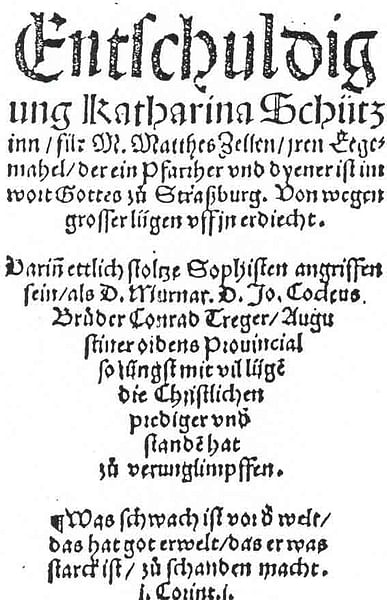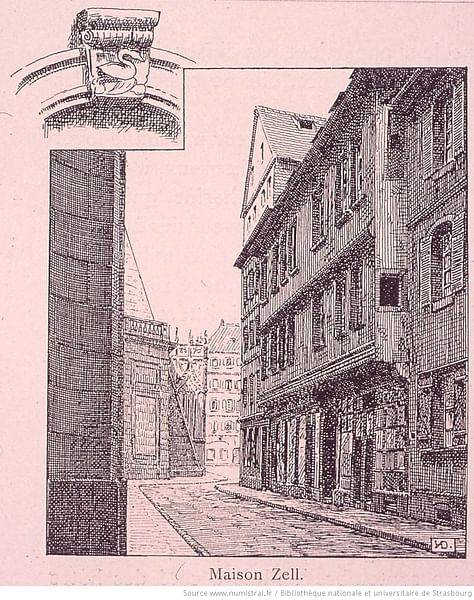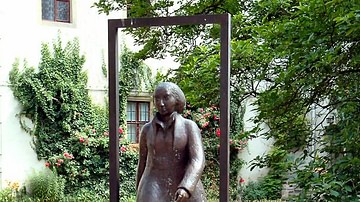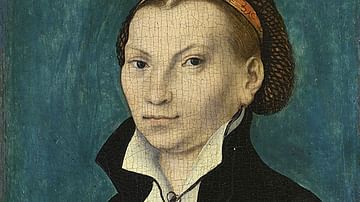Defending Clerical Marriage (1524) is an open letter by reformer and theologian Katharina Zell (nee Schütz, l. 1497-1562), written to justify the marriage of Christian clergy. The Catholic Church prohibited clerical marriage, but Katharina had married the pastor Matthew Zell (l. 1477-1548), was criticized for it, and wrote her best-known work in response.

Sometimes also known as In Defense of Clerical Marriage when anthologized, the full title of the work, as translated into English is Katharina Schütz’s Apologia for Master Matthew Zell, Her Husband, Who is a Pastor and Servant of the Word of God in Strasbourg, because of the great lies invented about him. Matthew Zell was a reformed priest in Strasbourg, and Katharina was a member of his congregation. She felt called by God to marry him as a way to set an example for others of Christian marriage and take a stand against the Catholic Church's teachings on marriage and clergy.
The Zells' marriage, as she notes in her letter below, caused considerable controversy, and several rumors and lies began to circulate about them both. Katharina fought back through her open letter and the pamphlets she wrote and published afterwards. She lost both her children when they were infants and her husband to disease but continued to minister and care for others while writing in defense of the Reformed vision of Christianity until her death in 1562.
Background
Matthew Zell was one of the earliest reformers in Strasbourg, laying the foundation for better-known activists like Martin Bucer (l. 1491-1551) and Wolfgang Capito (l.c. 1478-1541), among others. Zell became pastor of the Saint Lawrence Cathedral in 1518, just as the works of Martin Luther (l. 1483-1546) were beginning to stir what would become known as the Protestant Reformation. Zell embraced Luther's vision and preached the Reformed message to his congregation, converting Katharina, who then also rejected the Catholicism she had been raised in.
Their 1523 marriage, officiated by Bucer, was one of the first between a clergyman and a layperson and was almost instantly attacked by pro-Catholic writers as exemplifying how the Reformed message was corrupting Christian tenets and traditions. Christian clergy, they argued, had always remained celibate in keeping with biblical passages such as I Corinthians 7:7-9 in which Paul the Apostle says it is good for people like himself (a minister of the gospel) to remain unmarried. Martin Luther countered this claim in his The Estate of Marriage (1522), arguing that celibacy was unnatural and unbiblical as God had blessed humanity with sexual desire and commanded they "be fruitful and multiply" (Genesis 1:28). Luther argued that denying one's sexual urges led to both moral and physical corruption.
At the same time, the Catholic Church was defending celibacy and denouncing Luther, however, they were encouraging clergy who could not live according to the precepts of I Corinthians 7 to live with prostitutes or unmarried women, without fear of censure, as long as they paid an annual fee to the Church. When the Zells were attacked for their marriage, Katharina noted this point specifically in her open letter. The Church, she claimed, was not prohibiting clerical marriage for any spiritual reason but purely for financial considerations as, if they allowed clergy to marry, they would lose money.
Unlike Luther's work, Katharina's letter dispenses with the need to justify marriage as an honorable estate and focuses on the reasons why the Church prohibits married clergy and how this leads to corruption and hypocrisy. The first part of the letter deals with the Church's prohibition on clerical marriage, while the latter section addresses the lies that have been spread about her marriage to Zell. She concludes with an affirmation of her marriage and faith.
Text
The following text is translated from German by scholar Thomas A. Brady, Jr., cited in his Ruling Class, Regime, and Reformation at Strasbourg, 1520-1555. The letter has been shortened for space considerations and the missing lines indicated by ellipses.
Strasbourg, [before September 10, 1524]
…[The Catholic clergy] also reject the marriage of priests, although it is taught in Holy Scripture, in both the Old and New Testaments, not in obscure but in clear, plain language, so that even children and fools could read and understand it, as I have shown. I proved this in a longer writing to the Bishop of Strasbourg, in which I contrast marriage and whoredom with one another on the basis of Holy Scripture. I would to God that the bishop would get so angry with me that everyone would read my explanation.
Why, speaking of marriage, do they stand so firmly against it, as though they intended to spite God and suppress it by force? There are, I must relate, two reasons. The first is that the popes, bishops, and their lackeys, the vicars and their fellows, would not get so much whoring tax from married couples as from whores and rascals. If a priest has a wife, he behaves like any other honest, pious burgher, and he pays the bishop no tax for it, since God has allowed him to be free. If they have whores, however, they become bondsmen to the popes and bishops. Whoever wants one, must ask and get the bishop's permission and pay a tax for it. So the latter have devised an annual payment…which, poor or rich, the priest must pay, just like one who leases land from another and pays an annual rent for it, that's what they do. They have also set their own manager or steward over these leases, and he collects the annual dues. He is called a Fiscal, and he receives an annual salary.
So they protect and defend such outrages and vices against the whole of Holy Scripture, in which the Holy Ghost so strictly banishes the whoremongers, excludes them from the Kingdom of God, and forbids anyone to eat or drink with them – as St. Paul says in First Corinthians 1:5-6 and in Ephesians 5. God, however, established marriage for all men in the initial act of creation, and no one has been exempted from it [other than a few exceptions]. What God thus desires, they wish to condemn, punish, and forbid for all of those who come under their power. But the lewd chastity [and] whoredom, they do not punish, and have never punished it but rather protected it. Yes, clergymen and laymen have formed an alliance to struggle violently against God. Oh, the blindness of the rulers, how do you look to one another, [you] who should be dedicated to everything honorable? You must allow it to be said of you, that one has five or six whores, the other seven women birthing, plus a pretty doxy in the house and lots more…
The second reason [why the clergy are so set against marriage] is that if the priests have wives, they cannot exchange them among themselves, as they do with the whores. One goes out, another comes in. For St. Paul says, a bishop is a man who has one wife, for which reason he would have to live honorably, and if a wife did not suit, he could not exchange her for another. There is much trouble in marriage, for one must share and suffer with another, and of this they wish to be free. Yet very often whores, too, make trouble one does not have from a pious wife.
If the priests could honorably marry, they could preach from the pulpit more effectively against adultery. Otherwise, how can they condemn that in which they themselves are stuck. Watch over me, and I will watch over you. If, however, a priest had a wife, and if he did something bad, people would know how to punish him… Truly, why are such things not left as God made them to be, each having his wife to prevent licentiousness? Does God not know better than the Devil what is good?
For the prohibition against marriage comes from the Devil alone, but marriage comes from God, as the Holy Ghost says in the letter to Timothy. But if it were so, the laity would not tolerate such whoreson priests in their midst. When they die, the children grab on to the estate. Otherwise, the friends get it and kick the bastards out, for what do they care if the Devil takes the soul away…
Married priests, on the other hand, would be obliged to punish adultery with great severity, and as St. John says, it does not become you to have seven women in labor at once, that is, to live in whoredom, and nonetheless to help rule the land and the people…Thus, once a young fellow said, when he was being punished for his whoredom. "If I should not do it, why does my father do it? If he will forbid it to me, he must first be free of it himself."
Such are the faults of those who oppose the marriage of priests. Part of them consists of those who possess benefices and other things. Another part consists of their friends, fathers, mothers, siblings, aunts, and cousins. They, too, fear that if the priests can have wives and [legitimate] children, it will deprive them of their inheritance and other things. A third part are those who are actually involved in whoredom, for they fear that eventually they, too, will be at risk. Thus, in the end Sodom and Gomorra will be swallowed up in sulfur and brimstone that rains down from Heaven. Oh God, put an end to it!...
Should anyone say to me now that this is an ineptly long speech, which has brought you far from your starting point, my answer is to acknowledge this. It is true, but perhaps it has happened of necessity. If you mean that this matter is none of my business [I reply that] I have seen how many souls have been taken, and are still being taken, by the Devil. This is also a reason why I have helped the priests to establish [clerical] marriage. And the very first one here at Strasbourg occurred with God's help, for I had made up my mind not to marry. But then I witnessed the great fear, the raging opposition, and the great lewdness. When I nevertheless took a husband, I meant to give heart to and show the way to all Christians, as I hope to have done.
Therefore, I also wrote a little book, in which are displayed the grounds of my faith and the reason for my marriage. Which surprised not a few people, for no one had a clue in word or deed that I intended to marry, for which reason I had the idea that I needed to offer my reasons, so far as I have learned and knowing nothing to the contrary, also moved by my husband, namely, that he entered this marriage for the honor of God and the salvation of himself and all men. I find no trace of dishonorable desire or other such feelings in him. And I have been granted neither great wealth nor other gifts that might have motivated him.
His action, plus his teaching and his way of life, have brought him such envy from the godless, that his health and life are not worth more than those of the birds in the air and the worms in the earth, much less those of men. And, to return to my original aim of justifying my husband, I must say that such envy is so deeply rooted in the hearts of the godless, that if they could injure him in body, soul, or life, they have done so, and they have invented such devilish great lies about him and spread them through every land.
First, they say that I have abandoned him. That requires no answer. The liars themselves are shamed, for I have never spent a day outside of Strasbourg.
Second, they say that he hanged himself in sorrow for marrying me. This merits the mere reply that perhaps he has been transformed into a younger man of contrary mind. Yes, they would give half their wealth, were it true.
Third, since he didn't want to hang himself, they invented other lies. For example, that he seduced a local woman in a garden. Since this one wasn't believed, and their lie was discovered, they tried another one and invented other devilish and shameful lies, which they spread through the whole city of Strasbourg and in the countryside as well. One of them says that he beat me so terribly and such, that he often threw me out of his house. Another shameful lie tells that I found him with a maidservant, which I could not bear, and he beat me and kicked me out of the house…They lie so badly that they tell one tale in one place and another in another.
What shall I reply, except that they are the Devil's children? He is also a liar who produces such lies in them. For these stories have no basis, being concocted solely out of the Devil's inspiration. For my husband, as God is my witness that I do not lie, has been with me and I with him, and we have never disagreed, not for a quarter of an hour. Nor has he ever injured me in any way, large or small, with word or deed. Nor I him, I trust. And all I know at this moment is that we think of ourselves as one, and whatever conforms to God's will, that thing we shall do. As for the maidservant, I have no maid but only a little girl, still young and innocent, who knows nothing of such things, and to whom my husband has said no more than four words while he was at home. Nor have I ever detected such lust or wantonness in him. And even if the girl were old enough to give me such concern, the Antichrist keeps my husband so busy that, even if he were so inclined, he has not time for it.
To bring this briefly to conclusion…I will stand for him with my honor, body, and life, since such liars attack him undeservedly and without true cause and tell lies about him. For the stories that have been told about him are all concocted and invented, without any basis in fact. Toward me and toward the whole world, he behaves in such a way that no one can denounce him to the world, except by lies… Have they not gathered once again against God and His Word, in which Christ is proclaimed? Isaiah 47 says the same, how the just will be ruined here, and no one will take heed of them, but they shall one day have peace, etc. And all the prophets say how the just will be cast down, and the godless will rule, until God's judgment is passed over them.
Thus, we Christians should await the end patiently. For this reason, I have happily placed myself and my spouse in God's hand and may His will be done in us. I know of no greater honor we can experience than to die cast down by this world, and that he should speak to me, and I to him, on the cross, and strengthen each another. Therefore, he and I will bear such lies and every insult, yes, even death, in patience, peace, and joy, which are the fruits of the Spirit. And we shall say with the prophet Isaiah, chapter 41, Do good or evil, as you can, we will speak with and see one another and have no fear of any man.
Conclusion
Luther's work on marriage, as well as those of Reformers such as Huldrych Zwingli (1484-1531), Wolfgang Wyssenburger, and others who wrote on the subject, was denounced by the Church just as Katharina Zell's was, but she received harsher criticism as a woman presuming to teach men. Had she published Defending Clerical Marriage under her husband's name, as scholar Kirsi Stjerna notes, it would have been more widely accepted. As a well-educated woman who believed in what she was saying, however, she proudly claimed authorship of the work and of those she wrote afterwards.
Like many of the writings of the women of the Protestant Reformation, Katharina Zell's were attacked, denounced, and ignored during her life and eclipsed by those of male reformers afterwards. It was not until the 19th and 20th centuries that Zell's works began to receive the recognition they deserve, and it is only in the last 20 years that scholarly studies have been devoted to her. In the present day, she is better known than her husband, who focused more on preaching than writing, and her works are often anthologized along with those of other great writers of the Reformation period.






